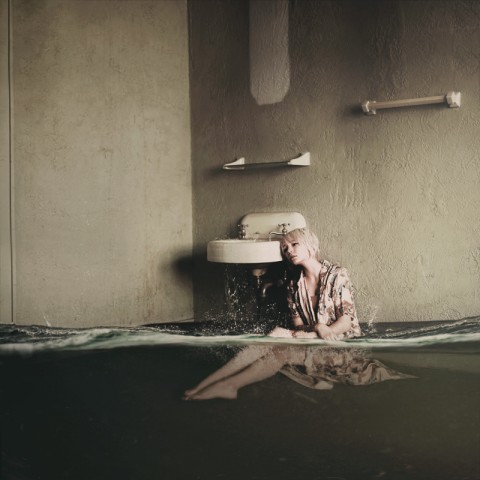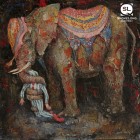My mother wore the broken back of the house inside her. She made us grey dinners and lifted her face to see our faces when our lips moved. “Hello,” was all her face said, even if we made her angry, even if I yelled at my brother for taking the last piece of breast meat off my plate and replacing it with a greasy wing. But our father exemplified purpose. “Pull the lines up when the ship’s captain has given the order!” he liked to say. “Wait for the captain to give the order!” Our mother stared at her broccoli, moved a lump of mashed potato across her plate. My brother stood up and stuck his ass behind the dining room drapes and farted. “Martin!” our father yelled. Our mother’s eyebrows shot up her forehead.
It was around this time that mother’s body began weeping. At first she looked as if she’d done some vigorous exercise, but she didn’t have the post-calisthenic glow, the shortness of breath. The sweat beaded her upper lip. Her bare arms would dazzle in stray beams of sunlight that found their way past the drapes. She continued to sigh and murmur, to walk through the house like she’d been there for centuries looking for an exit.
The moisture quickened until she began to drench and change her clothing. Father plugged in dehumidifiers, ran the sump pump in the basement. At night I’d hear mother get up and change her pajamas, father’s smooth grumble traveling down the hallway as she remade their bed. She had to stack her side with two sets, spread dry towel layers between.
We pretended there was no weeping. We’d watch television, eat our suppers, go to sleep and erase the day’s memories. Even as the wood floors began to rot from the constant moisture, even as the house began to flood, we saw nothing.
Our father kept to his program. “I work hard, and we will be fed each night on schedule!” he’d say to calm us when we appeared nervous. “The buoys are secured to the sides of the house!” He’d check his pocket watch, look inside our mouths to be sure we had all of our teeth, which were just like his only a generation younger.
I couldn’t blame him, I mean, I should have but couldn’t. Instead I felt sympathy. He’d often gotten drunk and told me the saddest stories he could think of, how he saw his own mother die one afternoon while he was home alone with her. How beautiful she looked when she sat bolt upright on the bed before lying back and leaving for good. He’d wanted to erase death from himself. But it was attached to the memory of his mother. Death like a little drill sergeant at his heels. “Toot! Toot!” It played a tiny trumpet and father marched faster, drank more. “Toot! Toot!” It played while he tore through the house on weekends. “I’ll take down the storm windows!” he’d announce; “I’ll mow the lawn!” “I’ll drive to the dump!” He’d speak through the dampness, the paper peeling from the walls, mother’s favorite brass lamp rusting.
We put the family photos on the life raft first and let line out the window. It was tethered there as the water rose around the house. We had to keep to the upstairs rooms, and moved the wood stove to the second floor bathroom, though not much would burn. We bailed the water into the tub when it seeped around us. We put towels around our mother’s body. “Don’t worry mother,” we’d say, opening the windows so that she could smell the dry night air and see the stars on the body of water she had made. She was something else now, floating all around us. Mother, disappeared.
I let the water bloom and lift my small body. I floated into the darkness, felt with my hands for the line attached to the raft, pulled myself aboard and lived on it for twenty years adrift. I sent you letters in the bottles I drank from. I caught bird fish from between the sunken forests. I know you found my letters and have read them. Which is why I want to tell you: you are safe now. No one will ever find you.



 The core workshop of SmokeLong Fitness is all in writing, so you can take part from anywhere at anytime. We are excited about creating a supportive, consistent and structured environment for flash writers to work on their craft in a community. We are thrilled and proud to say that our workshop participants have won, placed, or been listed in every major flash competition. Community works.
The core workshop of SmokeLong Fitness is all in writing, so you can take part from anywhere at anytime. We are excited about creating a supportive, consistent and structured environment for flash writers to work on their craft in a community. We are thrilled and proud to say that our workshop participants have won, placed, or been listed in every major flash competition. Community works.